 Thanksgiving is my family’s favorite holiday. Is it one of yours too? There’s something so powerful about a holiday that everyone celebrates in America because it is part of American culture, not religion. But you know what can really ruin a good holiday meal? Fat Talk.
Thanksgiving is my family’s favorite holiday. Is it one of yours too? There’s something so powerful about a holiday that everyone celebrates in America because it is part of American culture, not religion. But you know what can really ruin a good holiday meal? Fat Talk.
Hold the Fat Talk! 10 Tips for a Fat (Talk) Free Holiday Dinner
A collaborative body image article by Dr. Robyn Silverman & Dr. Lynne Kenney
With Thanksgiving on Thursday and many of the major holidays right around the corner, expectations run high. The grand dinner, the family gathering and…who’s done what since the last get together. You know what I mean. Who’s dating and who’s been dumped. Whose daughter was accepted early to the best program and who is licking her wounds?
And of course, who’s gained weight.
The comparisons slip off the tongue as easily as the marshmallows are stolen off the sweet potato casserole. It easily, seamlessly, and expectantly becomes part of the dinner conversation. Between bites, stares of “should you be eating that” meld with apologies for eating too much and promises to be “good” at dessert time. Each plate is then served with a hefty heaping of shame, blame, and naming names of those relatives or celebrities who are or are not adhering to the narrow definition of what is considered the standard of beauty these days. Is this really what Holiday Dinners are supposed to be about?
Fat-Talk-Free Holiday Tips
It’s time to take control of our holidays instead of allowing Fat Talk into the driver’s seat. Dr. Robyn Silverman and Dr. Lynne Kenney give you the tips to make your Holiday a positive experience where everyone involved can come away feeling good, strong, powerful, and supported.
Dr. Robyn Says…
(1) Declare the Holiday Table a Fat Talk Free Zone: In Good Girls Don’t Get Fat, I talk about establishing a Fat Talk Free Zone in order to take charge of what kind of “talk” you surround yourself with on a daily basis. Holidays, of course, are special occasions and times when we see people who aren’t in our every lives. While it may take guts, ask your guests (YES, your mother-in-law too!) to join you in making this holiday a positive one where you build people up rather than tear them (including yourself!) down. Hang it right on the door or by the Holiday Table; “You are now entering the Fat Talk Free Zone!”
(2) Don’t forget what Holiday Family Dinners are really all about:When you think of the true meaning of your holiday get togethers, they’re really about love, family, friends, and gratitude, right? I mean, what happened to the “Thanks” part of Thanksgiving? If we can focus on what we have—our strengths, our assets, and our support system—instead of what we lack, our Holiday dinners will surely be more enjoyable…and something to fondly look forward to and remember.
(3) Remember what Your Mama told you (if you can’t say something nice…): Whether it’s about yourself or someone else, snarky, rude comments hurt. They impact our minds and our moods and poison the dinner environment. And let’s not forget that such toxicity isn’t contained to that day. We remember those negative messages for years to come. Girls internalize it. Boys learn that this is a practice that girls do AND that girls should indeed hold them to such a narrow standard. Frankly, it stinks. So let’s change the dialogue we say to others and to ourselves.
(4) Start a new tradition: Some go around the table and say what they’re grateful for while others retell old family stories. In the spirit of Fat Talk Free Holidays, why not start a tradition of celebrating our strengths? Ask everyone to say 1-3 things that they feel are assets they possess. You can also go back around the table and flip it—what are 1-3 assets you admire about someone else at the table? This is not about competition or comparison but rather, about seeing people for their strengths rather than their deficits.
(5) Nip it in the bud: If someone starts to “fat talk,” pull them aside and remind them kindly about your Fat-Talk-Free Holiday plan. While some adults may be able to filter out opinions about fat, calories, and weight, children and teens are very impressionable. Your silence, in this case, can be seen as an endorsement of the behavior and what the guest is saying. Speak up so that everyone can get back to focusing on enjoying family, food, friends, and some fat-talk free time.
Dr. Lynne says…
(1) Think first, speak second. The messages you send your girls really matter. They listen closely and watch even closer. Are you commenting on your need to diet? Do you identify some foods as “good” and others as “bad.” At the dinner table recently I heard a mom say, “Eat your dinner so we ca get good stuff, the dessert.” Desert can indeed be yummy, but it’s not the good stuff. Stop labeling foods, eat a touch of it all without comments and judgment. Fat-Talk-Free is the way to be!
(2) Lift one another up. Family meals are not the time for devaluation and gossip. No need to criticize those who are not present or take advantage of the audience to make yourself feel better by putting others down. Turn conversation into opportunities to share experiences, learn what your family members have been up to and celebrate one another’s passions.
(3) Offer to share the space. Do you get anxious each holiday knowing that your mother or mother-in-law is going to steal the limelight with her extravagant meal offerings, only to hear that you forgot to add the garlic to the mashed potatoes? Call ahead of time and offer to host an evening in your own home so that you can all have an opportunity to throw a family gathering the way you like it. Perhaps Thanksgiving is always at one home, ask to switch it up. Have dinner Wednesday evening at your own home and invite everyone you love. Celebrate everyone’s passion for entertaining by telling family members they can bring a favorite dish. Just because Thanksgiving has always been one way doesn’t mean this year it has to be the same old status quo.
(4) Add an activity to the holiday weekend. Family activities like sports, games and crafts bring each other joy. Consider a family game of football, a walk in the forest, or a game of Bananagrams. You can find a list of fun family activities for your fridge in The Family Coach Method. Rebecca Cohen offers great tips on planting and playing outdoors. Download her family activity list and put some family fun in your holiday.
(5) Do something nice for others. There is no better way to teach your children to give back than to offer to make crafts with elders at a local senior center, serve a meal at the local food pantry or clean out your closet and give away what you don’t need. Enjoying a family meal is only one aspect of the holiday experience.
Conclusion
This holiday season is one you get to design. So move away from old habits and introduce new ones with some thoughtful planning and preparation. You may be surprised by how others willingly join in.
Are you ready to set the stage? Are you ready to speak up? We all must be accountable for stopping fat-talk at our holiday tables. Do it for yourself. Do it for the other girls and women at the table. Do it to reinforce the message to boys and men that beautiful women come in all different shapes and sizes. This Thanksgiving, let’s toast to a very happy, healthy, fat-talk free holiday! People will thank you for it…
Note: Dr. Robyn Silverman’s book is Good Girls Don’t Get Fat: How Weight Obsession is Messing Up Our Girls & How We Can Help Them Thrive Despite It.

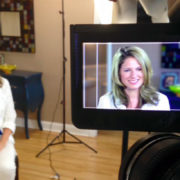
 spliced for time-sake and the initial sentence didn’t exactly reflect how I feel about the possible effects of mannequin size on body image. Whoops! So let me clarify! I do not feel that exposure to thin mannequins leads to poor body image. I do feel that repeated exposure to very thin models, very thin mannequins and messaging about the merits of dieting and thinness can have effects on the body image of many girls and women (my original quote). You’ll see more on my view below!
spliced for time-sake and the initial sentence didn’t exactly reflect how I feel about the possible effects of mannequin size on body image. Whoops! So let me clarify! I do not feel that exposure to thin mannequins leads to poor body image. I do feel that repeated exposure to very thin models, very thin mannequins and messaging about the merits of dieting and thinness can have effects on the body image of many girls and women (my original quote). You’ll see more on my view below!
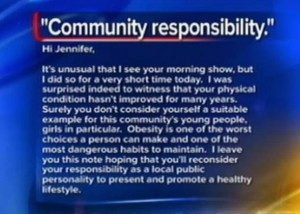 “Obesity is one of the worst choices a person can make and one of the most dangerous habits to maintain. I leave you this note hoping that you’ll reconsider your responsibility as a local public personality to present and promote a healthy lifestyle.”
“Obesity is one of the worst choices a person can make and one of the most dangerous habits to maintain. I leave you this note hoping that you’ll reconsider your responsibility as a local public personality to present and promote a healthy lifestyle.”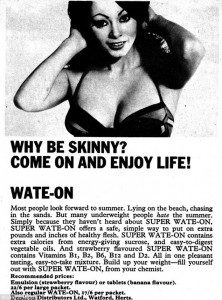 “Enjoy life!” “Put on 5 pounds of flesh!” “Left out because you’re too skinny?” Vintage ads paint the picture that full-figured women were the beauty standard of their era.
“Enjoy life!” “Put on 5 pounds of flesh!” “Left out because you’re too skinny?” Vintage ads paint the picture that full-figured women were the beauty standard of their era.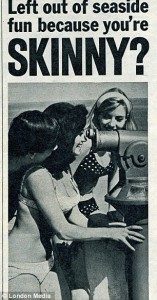 These days it seems that people say the word “fat” like they are spitting it out on a plate. This can be really confusing and upsetting for young girls who are going through puberty—a time when it’s very normal and natural to gain an average of 25 pounds! As a young girl or women is gaining weight, many look at it as “getting fat.” It’s common that people bemoan ‘I feel fat” or call themselves ugly names like “whale,,” “pig,” or “heifer.”
These days it seems that people say the word “fat” like they are spitting it out on a plate. This can be really confusing and upsetting for young girls who are going through puberty—a time when it’s very normal and natural to gain an average of 25 pounds! As a young girl or women is gaining weight, many look at it as “getting fat.” It’s common that people bemoan ‘I feel fat” or call themselves ugly names like “whale,,” “pig,” or “heifer.”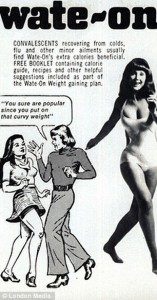 What would it have been like to live at a time when people thought it was more beautiful to be buxom that thin? Or is the pressure the same whether it’s to be thin or to gain weight in order to fit in?
What would it have been like to live at a time when people thought it was more beautiful to be buxom that thin? Or is the pressure the same whether it’s to be thin or to gain weight in order to fit in?
 It’s International Women’s Day—a day to reflect on the amazing women and girls in our lives but also to ponder what’s to come for the up and coming women in the world.
It’s International Women’s Day—a day to reflect on the amazing women and girls in our lives but also to ponder what’s to come for the up and coming women in the world. Thanksgiving is my family’s favorite holiday. Is it one of yours too? There’s something so powerful about a holiday that everyone celebrates in America because it is part of American culture, not religion. But you know what can really ruin a good holiday meal? Fat Talk.
Thanksgiving is my family’s favorite holiday. Is it one of yours too? There’s something so powerful about a holiday that everyone celebrates in America because it is part of American culture, not religion. But you know what can really ruin a good holiday meal? Fat Talk. “I was relapsing:” Eating Disorder Relapse & Support While Away from Home by our college blogger, Rebecca Tishman
“I was relapsing:” Eating Disorder Relapse & Support While Away from Home by our college blogger, Rebecca Tishman
 It’s Fat Talk Free Week and, like every year, we are being challenged to drop the fat talk between friends. This can be a tall order for many. Why? Because fat-talking has become a habit and a bona fide, integrated component of many friendship circles. Is it part of yours?
It’s Fat Talk Free Week and, like every year, we are being challenged to drop the fat talk between friends. This can be a tall order for many. Why? Because fat-talking has become a habit and a bona fide, integrated component of many friendship circles. Is it part of yours?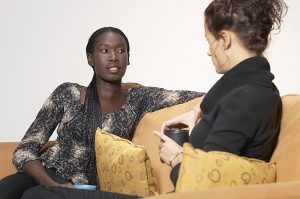 So what can you do about it?
So what can you do about it?